- Home
- J. R. Ellis
The Royal Baths Murder
The Royal Baths Murder Read online
ALSO BY J. R. ELLIS
The Body in the Dales
The Quartet Murders
The Murder at Redmire Hall
This is a work of fiction. Names, characters, organizations, places, events, and incidents are either products of the author’s imagination or are used fictitiously. Any resemblance to actual persons, living or dead, or actual events is purely coincidental.
Text copyright © 2019 by J. R. Ellis
All rights reserved.
No part of this book may be reproduced, or stored in a retrieval system, or transmitted in any form or by any means, electronic, mechanical, photocopying, recording, or otherwise, without express written permission of the publisher.
Published by Thomas & Mercer, Seattle
www.apub.com
Amazon, the Amazon logo, and Thomas & Mercer are trademarks of Amazon.com, Inc., or its affiliates.
ISBN-13: 9781542015424
ISBN-10: 1542015421
Cover design by @blacksheep-uk.com
To my mum and dad
Contents
Prologue
One
Two
Three
Four
Five
Six
Seven
Eight
Acknowledgments
About the Author
Prologue
The Harrogate Turkish Baths of 1897 survive virtually intact, with many of the original fittings still in place. They have recently been refurbished. The Baths have a Moorish design with Islamic arches and screens. The walls are of vibrant multi-coloured glazed brick. The arabesque-painted ceilings, Italian mosaic floors and polished hardwoods produce a period feel of luxurious colour and elegance.
‘And so, ladies and gentlemen, we are delighted to welcome back to this year’s festival the distinguished writer Damian Penrose.’
There was enthusiastic applause from the sell-out audience in The White Swan Hotel. It was a pleasant summer evening in Harrogate and the Crime Writing Festival was in full swing. Penrose, seated in an armchair on the stage that had been set up in the hotel’s ballroom, accepted the applause with a haughty nod in the direction of the audience. He passed a hand through his hair, ruffling his long and greying locks. He was dressed in a corduroy jacket and wore a cravat.
Penrose had had a long career as a successful, bestselling crime writer and was rumoured to be worth several million pounds. He had also gained notoriety due to his tempestuous private life and his frequent barbed comments about other writers. The latter had led to him being dubbed ‘Poison Pen’, a title in which he revelled: good writing was always assisted by bad behaviour, which created publicity and boosted sales.
The title of the event was ‘The Perfect Crime: Writing a Bestselling Crime Novel’, chaired by Ben Poole, a writer, journalist and presenter who was prominent on the circuit of local literary festivals. After Ben had interviewed Penrose, the session would be open to questions from the audience.
‘So,’ began Ben, ‘if I can ask you first of all, where’s your starting place when you’re writing a crime story?’
Penrose relaxed back into his chair with an air of arrogant nonchalance.
‘Inspiration comes in many forms to the mind gifted with imagination. I can see something while I’m driving or walking down the street, or read about some trivial event in a newspaper, and suddenly a plot unfolds before me. It’s quite an extraordinary process.’
‘And then it’s a question of crafting those ideas into novel form?’
‘Exactly, and that’s where the serious work begins. Of course, after so many successful novels, I’ve got it down to a fine art, so to speak.’
‘Quite. Do you have a set of principles that you follow?’
‘Oh, I don’t need those. It’s only weak and struggling writers who need props like that. Once I sit down to write, it flows without much difficulty.’ He turned to the audience. ‘My twentieth book is out soon, I’m sure you’re all keen to know.’
There was subdued laughter at this brazen act of self-promotion.
‘Yes,’ said Ben, who was already finding it difficult to get Penrose to talk about anything other than himself. ‘What do you think makes a good crime novel?’
‘There’s no formula for it. I just follow my instinct, and it’s never let me down in twenty books. You’ll have to ask my readers what makes my books so appealing.’
Ben was tight-lipped and trying to hide his irritation with Penrose’s behaviour. ‘How far do you base your characters on people you’ve known?’
‘Well, it’s a truism that one writes from one’s own experience. In my own case, for example, I’ve taken great pleasure in devising deaths for unpleasant females, based, of course, on my former wives, who tried to extract as much money as they could from me when we divorced.’
There was some nervous laughter.
‘And do you tend to incorporate things that have happened to you into your stories?’
‘Absolutely. A life as varied and fascinating as mine has yielded some wonderful material.’
And so it went on and, however hard he tried, Ben found it impossible to get Penrose to reveal anything about his methods or make any points that might be useful to a budding writer.
‘Well, thank you, Mr Penrose,’ said a weary Ben at last. ‘Let’s open this now to the audience. Any questions? Yes, over there.’
‘What advice would you give to a young writer?’ asked an earnest-looking young woman.
‘Stand on your own two feet and don’t expect people like me to help you along. No one did it for me. I get so many unsolicited scripts, most of which are utter rubbish. I don’t know what they expect me to do, when they don’t show any signs of real ability. It seems to me that there’s a terrible dearth of talent around at the moment; we’re a long way from the Golden Age that I remember.’
‘What do you think about writers who steal ideas from other people?’ This question was posed by a woman dressed in jeans and a strappy top, who’d been glaring at Penrose throughout his conversation with Ben. Esther Stevenson was also a crime writer, based locally.
Penrose initially frowned, and then smiled maliciously. ‘Obviously I think it’s completely reprehensible and it goes without saying that I am always very scrupulous about such matters.’
Stevenson gave an audible snort of contempt.
‘It’s only writers who lack ideas of their own who steal other people’s,’ continued Penrose.
‘Another question. Yes?’ The anxious Ben gestured to the back of the room.
‘Do you think it’s helpful if writers criticise each other in non-constructive and personal ways?’ The questioner was another local crime writer from York, Charles Derryvale.
‘It depends what you mean by non-constructive. I tend to speak about things as I see them. If I think a novel is leaden and tedious, I’ll say so. If I think the author would do us all a favour by not boring the pants off us with his or her awful writing, I’ll say that too. What’s more, I think this is better than much of the mealy-mouthed commentary peddled by those halfwits who call themselves critics. “The writer shows potential in his characterisation, but has not yet achieved consistency.” In other words, a lot of it was rubbish. That’s the kind of thing I mean.’
‘You go much further than that, don’t you? I’d like the audience to hear this.’ Derryvale, who was shaking with anger, started to read from a sheet of paper. ‘“Derryvale cuts a heavy and unwieldy figure in the world of crime writing and his heavy, turgid prose seems to reflect this . . .”’
A desperate Ben intervened before things got out of hand.
‘I’m sorry, I’ll have to stop you there. Can we please keep any personal disputes in the privat
e realm? This is not the forum to discuss them.’
Penrose smiled but Derryvale stuffed the paper into his pocket and stormed out of the room. A number of people heard him mumbling something about ‘making him pay’ and there was a hum of excited conversation.
Ben tried to restore order but only partially succeeded as the session limped on to a rather unsatisfactory close.
‘So thank you, once again, to our guest this evening: Damian Penrose.’
The applause this time from the somewhat confused audience was lukewarm, but Penrose didn’t seem to mind. He shook hands with his exhausted interviewer and immediately headed for the bar, which was in a large, comfortable room with sofas and armchairs, but Penrose took up a position on a stool at the far end of the counter, from which he ordered a double whisky. He sipped his drink and glanced around, hoping to see some of his admirers, but the seats were sparsely occupied, as many drinkers had moved outside on to a terrace to take advantage of the warm evening. Seconds later, however, he saw a group arriving, which included Stevenson, Derryvale and a man called John Sinclair: a publisher with whom Penrose had had a bitter dispute. They saw him at the bar and clustered at the other end. Penrose smiled as he spotted another opportunity to goad and provoke.
‘Ah, look who it is!’ he called across. ‘“When shall we three meet again?” I must say, this hotel is better than the blasted heath. What are you old crones plotting now?’
Derryvale was still red-faced with anger. He stared at Penrose. Stevenson clutched his arm and murmured, ‘Don’t . . .’
But Derryvale would not remain silent. ‘Your downfall, Penrose.’ He raised his glass. ‘I think we’ll all drink to that.’
‘You’re really quite pathetic, aren’t you, Derryvale? You can’t contain your jealousy of my success and you resent it when I write the truth about your miserable little efforts.’
‘At least they are his own efforts and not stolen from somebody else,’ retorted Stevenson.
‘Ah, Esther Stevenson, the Queen of Crime, as she likes to think of herself. At least, the queen in these benighted parts of the country, but she daren’t come down to London and face the competition where it really counts.’
‘Why would I, with people like you around?’
Penrose ignored this. ‘And are we still peddling the ridiculous and discredited notion that I stole material from you?’
‘Hardly discredited. I can prove it.’
‘Go ahead, my dear. I’ll see you in court.’
‘You might see me there first,’ said John Sinclair.
‘Oh, Sinclair of Sinclair Books. Are you still around? Is your little business surviving?’
‘Yes, no thanks to you.’
Penrose waved his hand in contempt. ‘I don’t support failing ventures.’
‘You don’t honour your obligations either.’
Penrose laughed. ‘What obligations? I’m not obliged to give you anything.’
‘We had an agreement.’ Sinclair seemed very upset, almost tearful.
‘Oh, please!’ Penrose snorted in contempt.
‘You’re such an arrogant bastard, you’re . . .’ Derryvale raised his voice, and Stevenson clung to his arm again.
‘Calm down, old boy, you’ll give yourself a heart attack in your condition.’
For a moment, it looked as if Derryvale was going to throw his glass at Penrose but instead he gulped the rest of the contents down and stomped out of the bar, followed by his companions.
Penrose chuckled to himself and ordered another whisky. A harassed-looking woman came into the bar and frowned when she saw Penrose. It was Patricia Hughes, the festival organiser.
‘Damian, can I have a word?’
‘Oh dear, it’s Patricia. What have I done now?’
‘Let’s sit over there, shall we?’ She indicated a table in the corner of the room that would offer some privacy.
‘Very well.’
They sat in armchairs opposite each other.
‘Can I get you a drink?’ asked Penrose while he sipped his second whisky.
‘No, thank you.’ Patricia leaned forward. ‘Damian, I specifically asked you to focus on writing in that session with Ben, but he tells me that you got into a nasty slanging match with Esther Stevenson and Charles Derryvale.’
‘Good Lord. I feel as if I’m in the headmistress’s office. Ben Poole’s telling lies, Miss.’
‘I don’t think so, Damian, and it doesn’t help if you don’t take it seriously. Look, people paid good money to attend that session, hoping to hear you talk about your work and offer some insights into writing crime. Instead they just get you boasting and slagging other people off.’
‘They started it by asking provocative questions.’
‘Oh, we really are in the playground now, aren’t we? “They started it.” Why did you have to rise to the bait? We’re paying you to deliver a good session for us.’
‘They got a good session; they got to see their hero: the internationally successful Damian Penrose.’
Patricia stared at Penrose with something approaching contempt. ‘It really is all about you, isn’t it, Damian? Just to see you is enough. Do you think people come to a festival like this as pop fans who just want to see their idol? They’re interested in literature and its crafting; some of them are aspiring writers hoping for some help and inspiration.’
Penrose simply grunted.
‘Well, Damian, I’m very disappointed. You’ve got another session coming up on Tuesday evening and I hope we get something better from you. If we don’t, I can’t see us inviting you again.’
‘I don’t think that will go down well with crime readers. They want to see the top people.’
‘Maybe they do, but they also want to hear something interesting. You’re not the only person around, Damian, although I know you think you are.’ She got up abruptly and left.
‘Stupid bitch,’ mumbled Penrose as he returned to the bar for his third whisky.
The rest of the evening proved disappointingly uneventful. Penrose stayed around conspicuously, but no one came up to him to say how much they enjoyed his work or to ask for his autograph. But what could you expect from a provincial place like this? The people here had no appreciation of real talent.
Eventually, the bar started to empty except for a group of younger writers who were still drinking enthusiastically and looked as if they were set for a long session, so Penrose, who was staying in the hotel, reluctantly sloped off to bed.
The early morning of the next day found Penrose walking through the quiet town centre. Every year when he was in Harrogate, he enjoyed visits to the Royal Baths. It was one of the few consolations of having to travel to the north of England and stay in a dull little spa town two hundred miles north of civilisation.
As Penrose was not the kind of person who enjoyed mixing with the hoi polloi, even if it was the middle-class hoi polloi of Harrogate, he had taken advantage of the opportunity to book a private session at one of the town’s most famous attractions. This was very expensive, and he had to attend early, before the Baths were open to the public. But it was worth it to have the swimming pool and all the steam and hot rooms to himself.
It was 8 a.m. when he arrived at the beautiful late-Victorian entrance. He pressed the bell. Inside, receptionist Carol Ashworth saw him through the glass-panelled door and pressed her switch to release the lock. Carol was a plumpish woman in her forties, with a pleasant smile. She was an avid reader of crime fiction, and looked forward every year to the Crime Writing Festival. She and her friends enjoyed walking round the town trying to spot famous crime writers, and they always treated themselves to tickets for at least one event. She regarded it as a huge stroke of luck that she worked at the Royal Baths, where the famous Damian Penrose came nearly every morning of his stay. During this period, she always volunteered to do the early shifts.
‘Good morning, Mr Penrose,’ she called breezily and beamed at him.
‘Good morning, Carol,’ repli
ed Penrose, who enjoyed any kind of flattering attention, especially from a female, and was always quick to return it. ‘It’s wonderful to have such a lovely greeting so early in the morning.’
Carol blushed. ‘Oh, thank you, Mr Penrose. Everything’s ready for you, if you want to go down.’
‘I will. Thank you very much.’
‘We open to the public at nine fifteen, Mr Penrose.’
‘Very well.’
Penrose headed down the marble staircase that led to the baths area, his footsteps echoing into the distance. Carol sat smiling at the reception desk. What a charming man he was! She couldn’t understand why he had such a bad reputation. A few minutes later Shirley Adams, the cleaner, came out of the office behind her, wheeled her vacuum cleaner into the reception area and began to clean the carpet. Carol answered some emails and texted some friends about meeting up for coffee.
The baths area was below street level. Penrose wandered through a little maze of branching corridors to reach the changing rooms, where he put on his swimming trunks. One of the reasons he favoured the privacy of these sessions was that he knew his ageing body was not so attractive these days. His leg muscles had atrophied, leaving his legs thin and shaky. His belly hung over his trunks in white folds of hairy flab and his backside was shrunken and limp. He was no longer the dashing and debonair writer of his earlier days.
It was satisfyingly quiet down here. The only noises besides the background thrum of the boiler were an occasional gentle hiss of steam and a gurgle or plop of water. Penrose started with a few lengths of the swimming pool. Whilst he swam, he thought with satisfaction about the encounters of the previous evening. He’d seen those three off, and as far as Patricia Hughes was concerned, she could do what she liked. To be perfectly frank, he was tiring of coming to Harrogate, despite the pleasures he was currently enjoying.
He emerged from the swimming pool, dried off and headed past the small cold plunge pool to the interconnecting steam and hot rooms. These were graded in temperature, and the steam smelled of eucalyptus. After a spell in the steam room, he cooled off in the cold plunge pool and returned to the dry hot rooms. The hottest of these reached 65° Celsius. As he sat on a stone bench sweating profusely, the hissing sound increased and a mist drifted in and became dense. He must have left the door to the adjacent steam room open. Surely something was turned up too high? And what was that dark shape moving by the door? Perspiration ran down his face, dripped from his nose on to his chest and formed rivulets over his belly. He sat with his eyes closed and was unaware of the figure now behind him, moving in ghostly silence towards him through the mist.

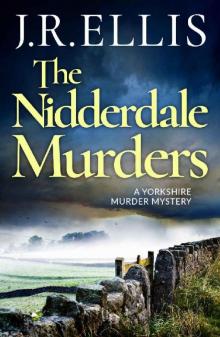 The Nidderdale Murders (A Yorkshire Murder Mystery)
The Nidderdale Murders (A Yorkshire Murder Mystery)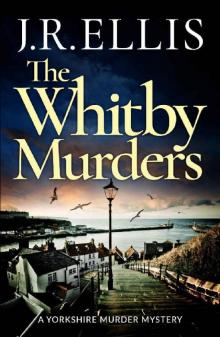 The Whitby Murders (A Yorkshire Murder Mystery)
The Whitby Murders (A Yorkshire Murder Mystery)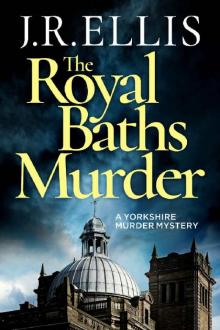 The Royal Baths Murder
The Royal Baths Murder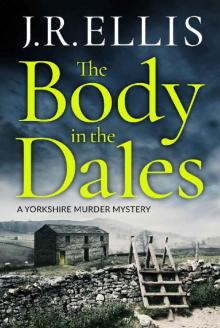 The Body in the Dales
The Body in the Dales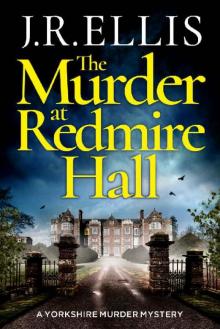 The Murder at Redmire Hall
The Murder at Redmire Hall